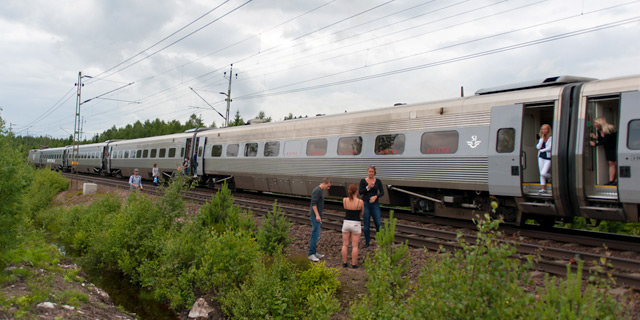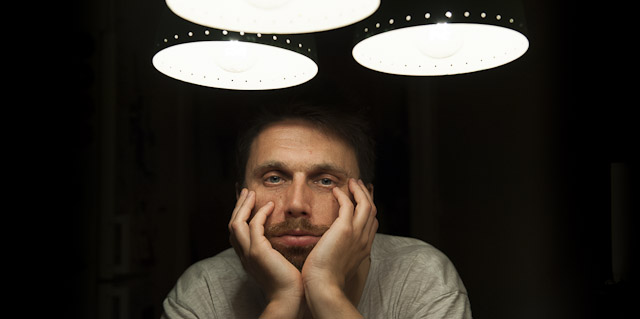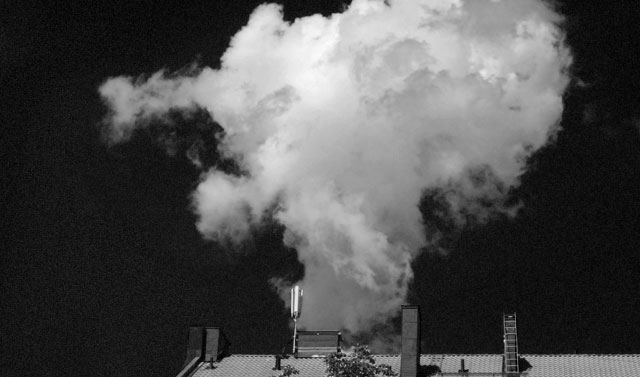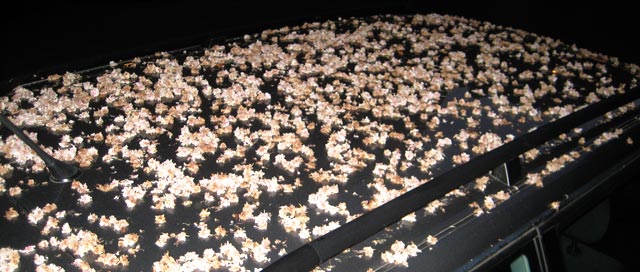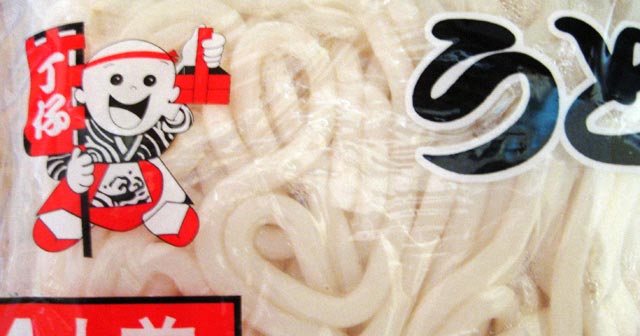We’re back from the trip and Wednesday passes in the sign of leisure. Me and Anna walk around the beach and try to find the “real” Sousse. There has to be something that isn’t geared towards tourists, something that keeps the local people sane if for no other reason than because it’s cheaper.
At a beach café we drink coffee, and even Anna puts sugar in it now because there’s a salty quality to the water – maybe they’re desalinating sea water, or the ground water is so full of it. It reminds me of how Iceland all smells like fart because of the sulphur that permeates everything.


A few tourists, seniors mostly, lay like beached whales on the scattered sun-deck chairs. Walking in sand takes time, and a few hours pass before we choose to take the inland way back. Along unfinished skeletons of hotels, and fancy resorts with tennis courts, we’re looking for food. Anna scores the only interesting foodstuff on the whole trip, a deep fried bread filled with egg and tuna, and is munching while we make our way downtown.
One of my few and (in my opinion) humble goals of the trip was to eat a lot of nuts. We passed a few stores that carried olives, beans and nuts, but to my dismay they proved to be as expensive as in Sweden. Considering that the average salary in Tunisia is one sixth of what it is in Sweden, we couldn’t see how people made by. Either Sousse is an expensive city and the salaries are adjusted accordingly because of the tourist trade, or there must be a big enough upper middle class that skews available consumer goods.
The train station is just next to our hotel, and we check the time tables for Tunis. Anna is by now fluent in French thanks to sheer willpower and mutilated Spanish, and once back with our friends we decide to take the train early next morning and be back the same day.
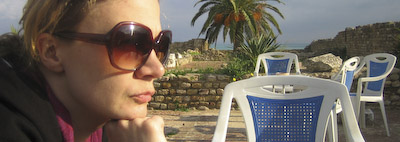
Thursday morning finds us hastily drinking coffee by the train before the station manager ushers us into the carriage. Afterwards, we’re not certain why he was in such a hurry – the train doesn’t leave until fifteen minutes later, and we’re longingly looking at the people who are standing outside, smoking. We needn’t have worried about this though, because smoking on the train in Tunisia is not a problem at all.
The vegetation outside our train is much greener, and there’s something reassuring about trees that don’t seem planted. With the ocean far away, smaller mountains to one side, the landscape is far more pleasant than in the southern parts of the country.
We’re going to Tunis and then onwards to Carthage. We’re unsure how to get to the ancient city, but that matter is sorted for us by a taxi-driver just outside of the station. Anna is certain that we’re being taken advantage of, but the price is low enough that no-one else minds. Carthage is a twenty minute drive away, and having probed us enough to realise we don’t know much about the city, most of the trip consists of our drivers incessant attempts at offering himself as our driver for a day. We’ll get to see all of Carthage and the blue city as well, all for the very reasonable price of 15 dinars per person. Too high price? Twelve dinars?
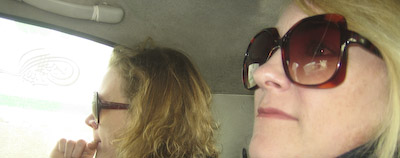
Having spend two days on a tour bus we’re not very keen on being herded from one Kodak moment to the other, and decline in different ways until we give up on it and Christoffer, who is riding shotgun and acts as spokesperson, is repeating “thank you for your offer, but we’d rather walk” over and over again. Once we get out of the taxi Sine gets the drivers business-card (on it, a picture of a Porsche) and he walks over to the other drivers, maybe hoping to snag us on our way out of the museum.
I eat crisps, the others eat sandwiches, and we’re all shivering with cold. The museum proves to be little better, and with our arms wrapped around ourselves we’re looking at relics 2500 years old – shards of pottery, glass works, someones skeleton.
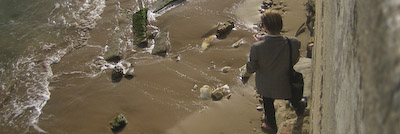
Some people can be swept away by the tides of history when they’re among old ruins, but that isn’t something that I’m good at. I can most often immerse myself in a photo or a description as much as the site itself, and looking down from the former fort atop Carthage makes my mind drift to more practical matters – i.e. where can I buy coffee – rather than back in time to when proud men would carve dentures out of bone at the age of 30.
In the store on our way out we meet three bored girls that are a wonderfully friendly bunch. One of them tries to pick up Christoffer, unbeknownst to him, and we’re all given fragrant ointments rubbed on our hands – the one on my right hand is “Tunisian Viagra”. Viagra here smells of peach and flowers.
Sine has had cramps the past hour or so, and she’s drinking Coke and then mint tea that the girls make. The one who tried to charm Christoffer now joins us in a light mocking of Sine, and suggests that we either lead her as a camel, or carry her as luggage. Ah, the good-spirited art of kicking those who are already down!
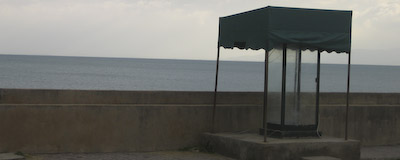
We’re walking down the hill, look at some water and the presidential palace (no pictures, please), and decide to take the commuter train to the blue city – Sidi bou Said – because apparently it’s pretty and some famous people decided to take consecutive shits there. The older man selling tickets for a pittance tries to scam Sine out of 20 dinars, and it takes a bit of standing around and staring angrily before he returns it.
It’s not the stealing per se that is annoying, it’s the nonchalant routine of it all: He couldn’t brake the twenty that Sine wanted to pay with, and asked her for smaller bills without returning the twenty – all the time acting as slow and ignorant as he could in the hope that we’d leave. It’s disheartening how common this behaviour is wherever tourists are involved; just be an asshole and whowever you’re scamming will get mad and leave, with little hope of reprimand.
Sidi bou Said is pretty enough, but how much sight-seeing can one take? Yes it has pretty blue decorations, yes I imagine that it must have been inspiring at one point, and no I don’t want to buy your chess-set nor water-pipe nor a henna tattoo. Somewhere along the way we have become so hungry as to be grumpy, and we’re walking to and fro before finding a café with a beautiful view and the most hideously crappy and clinically retarded staff ever. (Except the guy who made the expensive omelettes whom Sine liked.) The mood becomes rather grim in a general “fuck you I shouldn’t have gone on this trip you fucktart” way. Soon enough we’re smoking water pipe somewhere else, and start back to Tunis so as not to miss our train back to Sousse.

The commuter train takes longer than we expect, and we’re worried that we’ll miss our last ride. Once in Tunis it takes the help of a very well dressed man to show us the subway, and we’re soon in front of the train station with fifteen minutes to spare before departure. The bureaucracy of any given country is always interesting, and we encountered one at the train station. We had open return tickets, but before we were allowed on the train we had to validate extra return tickets and gotten them rubber stamped before showing them to three station hosts to get on the platform. It reminded me of all the meaningless jobs that people were made to have in communist Poland; you dig a hole, someone else will be along to fill it.
Once the train is rolling, a few young guys start banging out a rhythm on the walls and windows and singing loudly – we’re guessing it’s local talent warming up for a raucous night, and as charming as it might seem we’re glad when they get the hell off our cart and disappear into the night. The rest of the trip is spend sitting on the floor in between carts, smoking a lot and watching the wagon become more and more empty the closer to Sousse we get.
The bar on the corner is happy to serve us boukha and gin and beer and popcorn on small plates, and with one eye on the tv screens showing scantily clad women advertising phone-in sex-lines, we are summing up the past week. Sahara is an overwhelming place, tourism is rotting the country, and let’s buy a lot of olive oil to back home.
